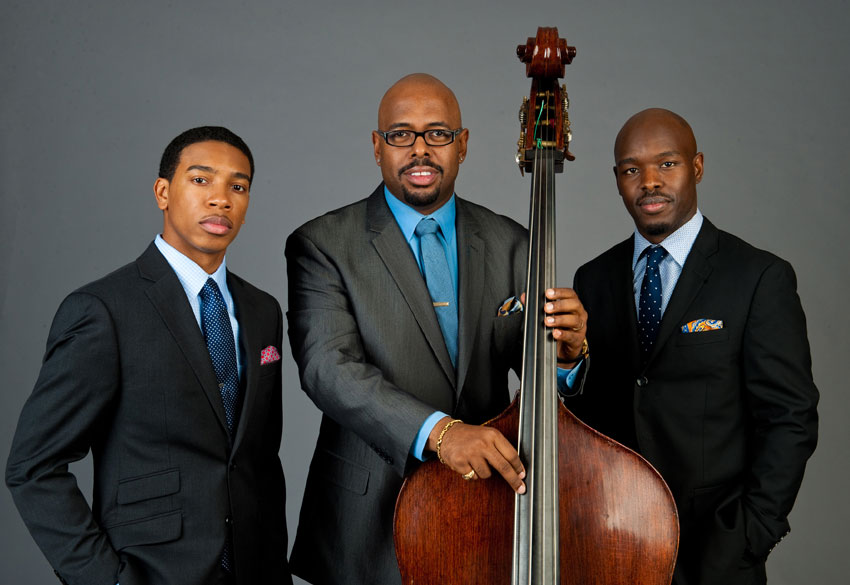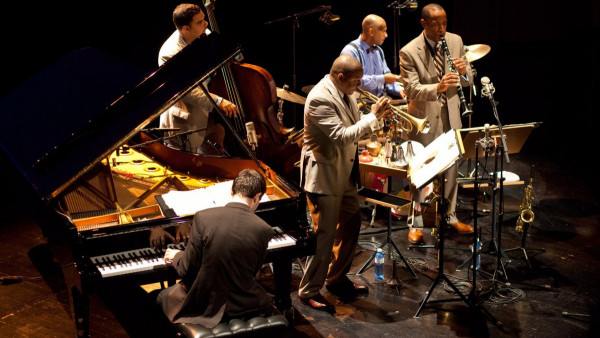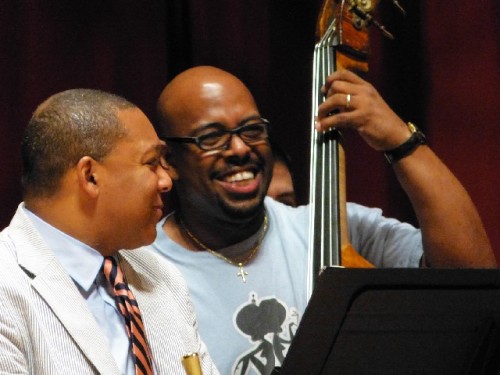I slipped away from the control board in time to hear the Christian McBride Trio and Wynton Marsalis Quintet at Ozawa Hall at Tanglewood on Monday. Both sounded great, and it was a real treat to get a first glimpse of McBride’s new trio with pianist Christian Sands and drummer Ulysses Owens, Jr. (You can get a first taste of them on CD via Owens’ outstanding Criss Cross Jazz release, Unanimous, which I’ve been playing heavily in Jazz a la Mode this year; the set’s divided between trio and sextet tracks, the latter featuring trumpeter Nicholas Payton. Mack Avenue is releasing a trio set under McBride’s name this fall.) On stage, and on record, the trio takes its cues mainly from the Oscar Peterson Trio. Bassist McBride has long been the Ray Brown of the Young Lions, a gang he chided himself for being too old to represent anymore, but Sands and Owens are among the most impressive of today’s pride, and Sands, who attended Jazz in July at UMass for several years and was mentored by Billy Taylor, sparkles at the keyboard.

The trio’s hi-octane set included Peterson’s “Hallelujah Shout” and Taylor’s “Easy Walker,” as well as “I Have Dreamed,” which featured McBride’s commanding use of the bow, and an extended performance of “My Favorite Things.” The Rodgers and Hammerstein classic is seldom heard in jazz sets these days, but McBride and Co. found plenty to explore in a tour de force divided into three sections spotlighting a different player in each. McBride, a refreshingly jovial frontman, closed the set with a few heartfelt words about the late Phyllis Diller, noting that she’d died with a smile on her face, and dedicating “The Most Beautiful Girl in the World” to her memory.
Marsalis may have had the comedienne in mind when he played “Goodbye” early in his set; whatever the motivation, the 50-year-old trumpeter remains a compelling ballad player. Wynton recorded Gordon Jenkins’s haunting theme over 25 years ago, but this was the first time I’ve heard him play it in concert, and it was a highlight of Monday’s concert. He opened with an unannounced original that echoed his late ’90’s Ellingtonian-flavored suite, “Big Train,” but this long work’s frequent shifts in tempo reminded me more of automobile traffic in Midtown and brought to mind memories of Piet Mondrian’s “Broadway Boogie Woogie” and the sounds of Raymond Scott’s “Powerhouse.”
For his encore, Marsalis recalled how another show biz legend, Pearl Bailey, did him a solid early in his career and told him to remember her example when he became established. Wynton, of course, has repaid Pearl and his other mentors many times over by offering his time, advice, and encouragement to promising players around the world. On Monday, he said the best gift a jazz performer could give or get was to improvise with other musicians, whereupon he invited McBride, Sands and Owens to join his quintet for a rousing finale that included “Cherokee.”

You’ve probably figured out by now that the Boston Symphony Orchestra has quietly abandoned its annual Labor Day weekend jazz festival at Tanglewood, which is puzzling given the substantial crowds that turned out for it every year and the celebratory air it fostered at summer’s end. I inquired of the BSO’s press office earlier this summer about the fest’s demise but haven’t heard anything official in reply. Here’s what Charles Giuliano speculated at Berkshire Fine Arts.
Given the demise of the festival and the recent decrease in jazz programing at WGBH, we’ve now seen two major Boston institutions with long legacies as custodians of classical music making decisions that adversely affect the availability of jazz to radio listeners and concertgoers in New England. With the exception of Marsalis’s Jazz at Lincoln Center, jazz has yet to establish a culture of its own with the means of endowing enterprises comparable to the BSO and WGBH, and that leaves the music as vulnerable as ever to the vagaries of commerce, shifting tastes, and the whims of presenters. In light of this, Monday’s concert, and this Sunday’s appearance by Chick Corea and Gary Burton at Tanglewood, raises one’s hope that jazz will be discreetly included in the BSO’s summer programs for years to come. If it continues to book artists of this caliber, and jazz develops a few more desperately needed marquee players, the music, however diminished from the scale of the former festival, should maintain a foothold in Lenox.
Speaking of Corea and Burton, the latest example of their mutual inspiration is a beautiful new set entitled Hot House, which you’ll hear plenty of in Jazz a la Mode this Fall. They’ll be at UMass on October 20, and I’ll be hosting a Listening Party a few weeks before the concert on October 1. Check with the Fine Arts Center for details and reservations.
Here’s Wynton, back when he was the de facto leader of the Young Lions, with Marcus Roberts, Robert Hurst, and Jeff “Tain” Watts, in a 1987 performance of “Goodbye.”
